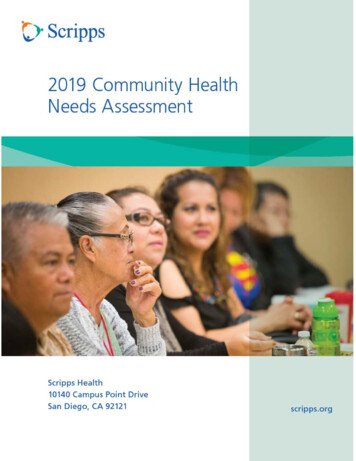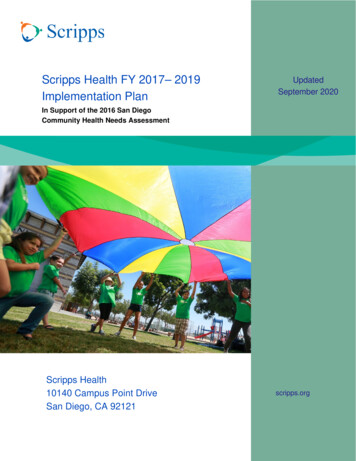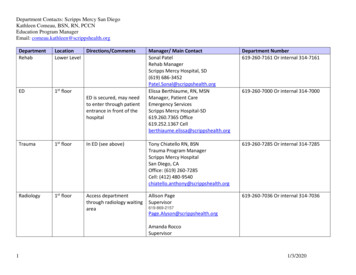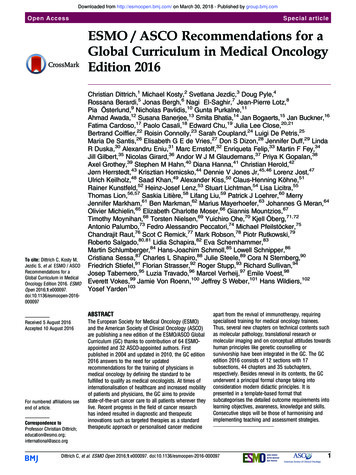
Transcription
E.W. Scripps School of Journalism Institute for International Journalism1Global SpotlightVolume 7 Issue 3 2014Women in the UAEEqual rights discussion ahot topic in Arab countryJapanese MusicJ-Pop idols inflateprojected CD salesGuatemalan FarmersPoverty and agricultureintertwinedGerman EconomyComplexity of recessionpresents challenges
2Letter from the editorsDear, readers:We believe that this issue of The Global Spotlightwill take you around the world and back, givingyou a glimpse of life in four continents as explainedby Ohio University journalism students. Over thecourse of our reporting, we spoke with the likes ofgovernment authorities, educators, farmers and music moguls. We used their unique vantage points toproduce a publication that is the product of the manyperspectives found around the world. We’re proudof this issue, and we hope you enjoy reading it.As journalists, it’s our duty to inform our readers of the world around us. There is no better way1. Guatemala2. Colombia3. Argentina4. Germany5. Czech Republic6. Italy7. Israel8. United Arab Emirates9. Ghana10. Tanzania11. South Africa12. Russia13. Japan14. Cambodia12to do so than gather stories from all corners of theglobe and put them together in one place. Althoughwe reported our stories from Athens—using emailand Skype conversations rather than conducting interviews in person—we believe we have capturedthe essence of the topics featured in our publication.It has been a pleasure producing this issue of TheGlobal Spotlight, and we hope you enjoy it. Thankyou for reading.Sincerely,The Editors-in-Chief4567893
Global Spotlight StaffEditors-in-ChiefMadina BaimagambayevaAmanda DePerroJim RyanRachel SayersCopy EditorsAyleen Cabas MijaresWilliam HoffmanJames RollerChad WeismanSupervisorDr. Yusuf KalyangoWritersMadina BaimagambayevaAyleen Cabas MijaresAndrew DavisAmanda DePerroOlivia HarlowWilliam HoffmanCaroline JamesWritersZainab KandehMegan LairdAlexandra RhueJames RollerJim RyanRachel SayersChad Weisman12131410113
4Women of Ghana: Fighting OnBy Megan LairdWomen in Ghana were not permitted to voteuntil 1954. As of 2010, only 65.3 percent of womenover the age of 15 could read and write.“Women are still expected to be the ones whotake care of the homes,” said Jim Weiler, a seniorlecturer and the acting Head of Department forHistory Education at the University of Education, Winneba. “Men are not supposed to enterthe kitchen, even in households where womenhave careers.”Traditional mindsets about gender roles leadto women in Ghana not only to work jobs, but toraise families and keep houses entirely on theirown, making success in school or in a field ofwork even more challenging.“By law women have equal rights as men inGhana,” said Sandra Bamfo, an economics majorat the University of Ghana. “However, in ruralareas the rights of women are infringed upon.African traditions counter the power of the law.This causes variations in how rights of womenare respected across African countries.”Mindsets of the past, particularly those ofmen, run the country of Ghana. In 2012, only 8.3percent of women actively participated in politics,according to an article posted by The FoundationFor Security and Development In Africa.“Formerly in Ghana, women were subjected todoing house chores and not doing anything betterthan that This problem still has an impact inthe society of Ghana,” said Frederick Kponyo, aresident of Ghana. “Women are undermined whenit comes to job opportunities since they are seento be fragile and too emotional.”Women’s rights organizations have been fightingfor years in Ghana, and women have increasedOne of the many beautiful products fromA Ban Against Neglect.Credit a ban against neglect.their numbers in the government, even if thosenumbers are still dismal. But some are more optimistic.“Ghana has shown significant change inits view of women in the past years; it has evenstarted to show in politics despite a great deal ofoccupational prejudice,” said Michael Tawiah, aforeign exchange student at Ohio University fromGhana. “We now have our first female speakerof parliament, its first ever female chief justice, ahandful of MP's, some top female TV presentersand some top female corporate executives.”The changes that have occurred in Ghana can becredited in part to the work of organizations suchas A Ban Against Neglect (ABAN), a non-profitorganization that works to empower young women in Ghana by creating products made out ofrecycled plastic that litters the streets of Accra.You can browse their website for handmade bags,wallets and jewelry.“As an organization, what we are seeking todo is to empower women economically, a modelwe believe will end the cycle of poverty in Ghana,” said Doris Darkwah, programs coordinatorfor ABAN.For Ghana, the wall of inequality has begunto come down. It is up to the women and organizations to destroy it for good.Influencing Tanzaniaat the FoundationBy James RollerEarlier this year, China and Tanzania celebratedthe 50th anniversary of what has been described byTanzanian President Jakaya Kikwete as "Mutualtrust at bilateral levels."As China approaches economic dominance,those investments have garnered attention fromother world diplomatic powers. But the effectsof China’s investments in African countries likeTanzania mostly go ignored, though this investment stands to change the lives of many Tanzaniancitizens.Chinese Infrastructure in TanzaniaRev. Reginald Mrosso runs a Catholic missionin the Manyoni District of the Singida, an isolatedand rural region of Tanzania. The mission has ahospital and nursing school called St. Gaspar,which sits 40 kilometers off the highway nearManyoni. A new road from Manyoni reachesSt. Gaspar Hospital and has allowed many morepeople to receive healthcare."There has been a cry for over 20 years sincethe hospital was opened," Mrosso said. "It wasso difficult to reach the hospital especially duringrainy seasons. Now with the new road, patientsand relatives can easily reach it."Roads like these are being built by Chinesecompanies all over the country.According to AidData, an organization thattracks the flow of Chinese investments into Africa,the value of the 16 infrastructure projects China iscurrently involved in are worth over half a millionU.S. dollars, and rates offered by China makefor a deal Tanzania can't refuse. "The Ministryof Foreign Affairs and Ministry of Commercealso offer interest-free loans and grants, whichare financed by the Chinese government,” CharlesPerla of AidData said.Tanzanians Studying in ChinaYoung people who want to be a part of theTanzanian business scene are becoming veryinterested in Chinese language courses, and inattending Chinese universities.“[I chose China] because in Tanzania 80percent of our products come from China,” saidTanzanian student Sadam Mohammed. “If you’regoing to do business, it comes from China, soit’s better to see the place where it comes from."Sadam mentioned that it was easy to find aChinese university. China has a large Tanzanianpopulation, and the Chinese universities havebeen recruiting international students by wordof mouth, so Sadam was connected to Guang DongUniversity through friends in China.However, China may be getting more aggressivewhen it comes to recruiting international students.Organizations like the Tanzania-China PromotionsCentre are attempting to be the conduits betweenTanzania and China. The center is a for-profit institution that focuses on placing Tanzanian studentsin Chinese universities.Chinese Language in TanzaniaUniversities in Tanzania are also embracingChina's influence. The University of Dar es Salaamand the University of Dodoma both have Chineselanguage programs now. Magosho thinks theseprograms will expand. “People learn hoping thelanguage could help them when communicatingto Chinese trade partners," Magosho said.China's influence is now reaching Tanzaniaand other nations across the world, similar to howthe U.S.’s influence spread to Japan after WorldWar II. U.S. influence gave Japan capitalism andbaseball. It's not yet certain what China's lastingeffect on Tanzania will be.
It’s a Woman’s WorldBy Zainab Kandeh“At 43 years old the United Arab Emirates maybe one of the newest countries on the map, butwhen it comes to empowering women they standat the front of the line.In September 2014, Major Miriam Al Mansouri became the first female fighter pilot to flyan F-16 in the UAE when she led an airstrikeagainst ISIL. While Al Mansouri’s achievementis likely to open more doors for women in themilitary, her success is but one of many enjoyedby women in the UAE.tions, it’s important for people to remember that noone place is alike, especially in the Middle East.“The world should understand that women inthe Arab world have accomplished a lot,” AbuGulal said. “Different countries in the MiddleEast have different traditions and interpretationof religious matters.”The veil, or hijab, that many women wear hasalso contributed to the notion that women in theMiddle East are oppressed.“I know that my veil sends different messages,”Africa 5”looking for new experiences.“There are a lot of Arab CEOs and WesternCEOs in good positions and I think Sheikh Mohammed bin Rashid Al Maktoum really pusheswomen to be entrepreneurs and he pushes themto hold management positions,” said CarissaCrowley, Australian native and head of corporate communications at Supreme Group. “If youcome here and you have education and ambitionyou can really make something.”Assistant Manager of Knowledge ManagementI am covering my head but not my mind. what I am wearing does notrepresent my personality, my thinking and who I am as a personThe country holds one of the world’s highest literacy rates for women, with many in high-rankingpositions of government and advocacy. Althoughwomen have been called the backbone of society,popular media portrayals often cast a shadow overthe advancement of women in the Middle Eastby illustrating a story of oppression.Legal Consultant and co-founder of the WomenLawyers Group Middle East, Raya Abu Gulal saidwhile it’s heartbreaking to hear such misconcep-said Nada Altaher, applied communication chairof the Higher Colleges of Technology’s DubaiWomen’s College. “I am covering my head but Iam not covering my mind. Whatever I am wearingdoes not represent my personality and my thinkingand who I am as a person.”Boasting a population of over five million, theUAE is predominantly made up of expatriates.Rich in more resources than just oil, the UAE isbecoming a country of opportunity for expatriatesHanan Al Muhairi founded an organization calledArybana, which began as a female horse ridingteam, but has grown to become a non-profit focused on enriching women’s issues in the UAE.“The UAE as a country has given women somany support that women now are lawyers, doctors, directors and even government ministers,” AlMuhairi said. “I would say nothing is impossiblefor Emirati women. If they have strong will anddetermination, for us the sky is not the limit.”Empowering a Youthful VoiceChildren’s Radio Foundation sheds light on issuesfacing South AfricanyouthBy Jim RyanWith a hint of nervousness, a young reporterapproaches his subject—a South African authorknown for her children’s books. The reporter introduces himself, adjusts his microphone and askshis first question: “What did you eat for breakfasttoday?”Stifling a giggle about her response—“Is thatall?”—the reporter concludes his microphonecheck and proceeds to the real subject at hand:South African storytelling and youth literacy.Author Lesley Beake later gushed about thepreteen reporter’s professionalism, poise and confidence. His news organization, the Children’sRadio Foundation, aims to instill each of thosequalities in its young reporters.The foundation trains African youth ages nineto 20 to report and produce radio packages that airon radio stations around the continent. It reachesmore than seven million listeners each week. Morethan one million of those listeners hail from SouthAfrica, where the foundation has partnerships with12 community radio stations and puts almost 200youth reporters to work.They tell the stories of their communities andthe issues facing them, such as the HIV/AIDSepidemic that plagues South Africa, internationalpolitics, education and health. They cover lightertopics too. Stories about musicians, dance andchildhood dreams are told during recent shows,published weekly on air and on the online audioplatform Soundcloud.Reporters are not fed stories from a producersitting behind a keyboard somewhere either. Theypitch the stories themselves, and make their finalproducts reflective of what they are experiencingin their daily lives.“They take ownership of the show and whatit looks like,” said Nelisa Ngqulana, a Children’sRadio Foundation director. “It really gives themconfidence that the product that comes out isowned by them.”Before reporters hit the streets to work ontheir first stories, they are paired with professionalmentors—many of whom learned the ropes asyouth reporters—to complete a four-step radiotraining program.Thabo Leping, a manager for Aganang FM, acommunity radio station in South Africa’s NorthWest province, said that radio stations jump at thechance to partner with the foundation because itoffers them the opportunity to train prospectivereporters and create content that interests a youngaudience.“It is important to give young people opportunities to express themselves, or come up withtheir own solutions on how to solve the challengesthat we are facing as a society,” he said.Foundation officials say that their reporters areless likely to delve into lives filled with crime,drugs and gangs—problems some have chosento report on—after they have gone through theprogram.In some respects, Beake said, the reportersare helping shape that environment as well. “Ialways feel that children—generally, not just inSouth Africa—need to be given the chance to begood at something, to succeed. Children’s RadioFoundation is doing a very good job of that.”Children’sRadio Foundation reportersinterviewU.S. Ambassador PatrickGaspard whenhe visited theManenbergcommunity.Credit Children’s Radio Foundation
6Coffee in the Cloudsand the LIFE WORTH LIVINGBy Chad WeismanKfir Shoshana shows up to Coffee Annan longbefore the first day-trippers glide up the side ofMt. Bental to look eastward over the Valley ofTears. He flicks on the lights in the wood-paneledshop, warms up the espresso machines, grinds thebeans and makes the bakery.“Like heaven,” says Shoshana, the manager ofthe mountaintop cafe. “In the morning, you cansee the clouds—a clear view.”Coffee Annan—“Israel’s highest restaurant”—translates from Hebrew as “Coffee in the Clouds,”a play upon the name of the former U.N. SecretaryGeneral.The 1,165-meter peak on which it sits is approximately 2 miles west of the U.N. Disengagement Observer Force Zone, a buffer between Syriaand Israel on the northeastern cusp of the GolanHeights.Jabal al-Gharam, Bental’s Arabic name, translates as “Mountain of Lust,” reflecting a roundlydivergent perspective on the site of the Yom KippurWar’s bloodiest tank battle. Today, tourists canhear the clamor of explosions and see the roilingclouds of smoke hovering over distant Damascus.“We hope the border will be quiet sometimesoon,” said Shoshana.Days earlier, Israel shot down a Syrian planeas it entered Golani airspace. Coffee Annan’s employees were too busy working to witness thealtercation firsthand.“We hear the bomb, we go outside, we seethe cloud of smoke,” said Shoshana. “We don’tafraid because we have a good army, but we hear,all the time, bombs. It is disturb to hear the war.”There are no monuments on Bental. Scrapsof ruined weaponry sit as artwork—emblems ofcontinuous renewal. Trenches used during the YomKippur War remain. Tourists can pace among thesilhouettes of cutout soldiers, all while enjoyinga latte or espresso.“It’s not just a historical place,” said GiliHoupt, an Israeli tour guide. “It’s also a placeof tourism. In Israel, every place of tourism isconnected with the history; the history of Israelcannot be separated from the military aspect.”Coffee Annan is owned by Kibbutz MeromGolan, an agricultural-industrial community witha “resort village,” and farms that cultivate produce and livestock. The Kibbutz houses BentalIndustries, which supplies motion components todefense contractors like Boeing, IBM and the IDF.Joanne Klein, a tourism official, is a proud resident. “It’s a small community,” she said. “We havea great life. it’s an amazing part of the country.”The International Community classifies MeromGolan as an illegal settlement, a designation Kleinresents.“The U.N. is a waste of space,” she said.“Syrians have been killing their own people forthree years, Iran is trying to make a bomb andkill us but when Israel defends itself thenthe U.N. has to investigate.”Much of Kfir’s family lives in Beersheba, inthe northern Negev. When the city came underrocket fire this summer, he feared for them, butwas forced to focus on the day-to-day operationof Coffee Annan.“It can be pretty hard in the land of Israel,”he said. “Sometimes it is difficult to open thisplace—to bring the water, to bring electricity.It is not a normal place, but this is what I like.”“We’re just living our lives,” said Klein. “Oneweek a bomb was sent over our neighborhood,and my children had to run. I know of no reasonwhy a child should ever have to live through that.”Approximately 513 children died in Gazabetween July 8 and August 26 during “OperationProtective Edge,” Israel’s most recent campaignin the exclave region.The Valley of Tears, from the summitof Mt. Bental. Credit Merom GolanTourism.Cambodian Education SystemRemains Corrupt“In struggling to overcome the haunting history of Khmer Rouge, Cambodia has focused onreclaiming cultural identities by restructuring itseducation system, which was obliterated thirty-fiveyears ago.During the 1975-1979 genocide, Cambodianintellectuals were eradicated from the country. Ap-”By Olivia Harlowattendance, crowded classrooms, corruption anddisparity persist. Although Cambodia’s constitution offers nine years of education to all itscitizens, the service is rarely delivered.Wath Saw is the first of his family to have completed more than six years of school. He attendsone of Cambodia’s top universities, Pannassastra,uneducated their entire lives, without exposure toa single year of school. Though 96 percent attendprimary school, only 34 percent of students continue on to grades seven to nine, and 21 percentto grades 10-12.Furthermore, rural areas lack easy access toeducation; 85 percent of Cambodians are farmers,Education is the basis for everything—if you don’t build it right, itwon’t happen. i hope that the government takes responsibilityproximately two million were killed, specificallythose Pol Pot felt were scholastically superior tohim. Nearly 90 percent of teachers were murdered;the rest fled the country.Since Pol Pot’s regime, Cambodia has expanded education, as the number of schools (andthe student-teacher populations within them) hasincreased.But despite progress, dropout rates, inconsistentwhere he studies International Relations. Cambodia “doesn’t really provide free and fair educationto everyone,” he says.The country requires students to purchaseuniforms, and getting to and from school requiresowning a bicycle or motorbike. Most familiescannot afford these things; 18.6 percent of thepopulation lives below 1.25 a day.Subsequently, four percent of Cambodians areand 36.1 percent of children perform agriculturaljobs at home that would elsewhere be deemedunfitting for their ages.Schools in rural areas lack access to cleanwater, electricity, health-care and operable roads.In contrast, it is clear that Cambodian educationfavors large cities. The disparities between wealthyand poor have led to consequential achievementgaps. [Cont. on 7]
Asia 7Japanese “Idols”Inflate Projected CD SalesBy William HoffmanJapan is a powHamamoto Ryo,aapaneseserhouse in the AKB48,AKB48,a popularpopular JJapanese groupgroup,, hashas soldsold CDCDs containingcontaining ticketstickets toto its guitarist, is not readyinternational tech its performances, encouraging fans to buy multiple copies.to go digital:market, constant- performances, encouraging fans to buy multiple copies.“I don’t like it,” hely introducing insaid. “When you buyteresting new gada CD or vinyl all thegets. But when itinformation comescomes to CD sales,with the music I canthe world’s secappreciate the musicond-largest musicmore.”market is a blastFor many it’s not anfrom the past.easy transition. SpotiThe New Yorkfy is not available inTimes reporteådJapan, a major disadin September thatvantage to rights ownCD sales accounters who could use thefor 85 percentstreaming service toof market share,recover revenue fromcompared with 20declining CD sales.percent in the U.S.BabyMetal, an idolTheories pregroup that mixes metalsented to explainand J-Pop, said they letthe phenomenonfans drive the group’sinclude culturalsuccess.affinity for tangible“It was never thatobjects, poor wirewe put out an ad in aless speeds, and inor on theCredit Eugene Hoshiko/Associated Press magazinedustry-wide resisbillboard or on thetance to streamingTV,” said KobaMetPerks for additional purchases include chances al, creator and producer of the idol group. “Evservices such as Spotify or Google Music.On the other hand, Jennifer Matsue, Associate to meet, take photos with, or shake the hands of erything just kind of happened without anyoneProfessor of Music and Anthropology at Union idols. “AKB48 even did a campaign where you doing anything.”College, sees a trend resurfacing from the 1980s— could vote for your favorite member,” MatsueBabyMetal’s international success comes insaid. “But you had to get the code that was in large part because of their viral videos. “Gimmeteen idols.“They are marketing characters,” Matsue said. that CD. Some people were buying 100 CDs.” Chocolate” has garnered 16 million views on YouIdols need not be actual people. Hatsune Miku Tube, Japan’s largest streaming service.“Their job is to sell other things.” If they sing,dance, or act too well, they risk alienating them- is another idol who debuted in the U.S. on theNo matter how good the technology gets,Late Show with David Letterman.selves from consumers.Matsue said there is a significant racial barrierShe also happens to be a digital hologram that Asian musicians have to overcome to makeThe most popular such group is AKB48—61 women whose ages range from early teens to projection.it in a western market.Miku is a notable exception; most Japanesemid-20s. Their size allows audiences to meet and“It’s purely racial,” Matsue said. “[While] it’stalk to their favorite idols at venues throughout bands have a hard time crossing the Pacific. changed a lot, you don’t see a lot of Asian faceJapan. The catch: fans can only acquire tickets Moools, an indie-rock band, has been struggling in rock or pop. People aren’t associating Asianfor over 15 years to get discovered.if they buy CDs.face with authentic rock.”Cambodian Education System Remains Corrupt[Cont. from 6] Without adequate funding and increased ease of access, Cambodia cannot hopefullycreate permanent changes within its educationsystem and society at large.There is an evident disparity between thewealthy and poor, leading to a consequential gapin terms of academic success. Private sectors existonly in high-class areas, proving that typically onlythe wealthiest children can excel academically.Without adequate funding for educators andincreased access in rural areas, Cambodia hasno hope of creating permanent changes withinits education system.Cambodia spends only 2.6 percent of GNP oneducation, pledging 1.50-1.75 per student in primary schools. This subsidy is insufficient for themost basic teaching materials and operating costs.“You can buy your grades,” said Chris Eijkemans, Country Director for Oxfam International,a poverty-eradication NGO. Many teachers chargefees for classes, and some sell answers and degrees to students.“Education is the basis for everything,” saidEijkemans. “If you don’t build it right from scratch,then it won’t happen. What I really hope is thatthe government takes responsibility.”Cambodian children often do nothave access to public education.Credit Olivia Harlow
8Education opens a door forArgentina’s TransgenderPopulationBy Rachel SayersOn the evening of August 18, 1996, ayoung woman stepped into the passenger-sideof a police vehicle. Later that night she wasfound on the street bleeding from two gunshotwounds to the penis.At her time of death, Mocha Celis was34-years-old and illiterate. Because of herlack of education she had taken the only jobavailable to her: prostitution. Though legal inArgentina, prostitution accompanies a lifestyle encumbered by violence, disease, andpolice harassment.“People thought I did it because I wantedto, not because I had to,” said Virginia Silveira, a transgendered woman and formerprostitute of Buenos Aires. “I did not consider it my job, it was simply the only wayto survive. All my friends and every singletrans person I knew were prostitutes. Theyhad no other option because no one wouldhave them for any other job.”The problem was addressed in 2010 whenArgentina became the first Latin Americancountry to legalize same-sex marriage, thenlater in 2012, when Congress passed a GenderIdentity Law that affords Argentinians theright to recognize their own gender identity,without requirements like genital reassignment surgery, hormone therapy, or psychiatricdiagnoses.It is an emphatic step for a country stillrecovering from the atrocities committed bydictator Jorge Rafael Videla, who murderedmore than 30,000 people during his 19761981 regime—including hundreds of transgender activists.Residual attitudes from such atrocitiespervade all aspects of transgendered Argentinians lives, perhaps nowhere as impactfulas education. A study published in 2006 bya local human rights organization found thatmore than 64 percent had not completedprimary school; another 20 percent had notgraduated from secondary school.“It wasn’t my classmates who discriminated against me, it was the institution itself,” explained Silveira. “They wanted meto match my appearance to my biology. Theywanted me to act like a boy and dress like aboy, things I wasn’t comfortable with. Theymade me quit [School].”After years as a prostitute in BuenosAires, Silveira found out about and enrolledin the world’s first school for transgender,transsexual, and transvestites.The “Mocha Celis” Popular Baccalaureateopened in Buenos Aires in March 2012, justmonths before the Gender Identity Law wassigned into effect. It offers an acceleratedthree-year program for students over the ageof 16 to earn their high school diplomas.“We could not live in a country where gender identity stood as an obstacle to the accessof a basic right like education, said founderFrancisco Quiñones. “So we hatched an ideathat eventually became ‘Mocha Celis.’”‘Mocha Celis’ will graduate its first classthis year.“I’m going to be a lawyer,” said Silveria.“I want trans people around the world toknow that their rights are not gifts from thegovernment. [Their rights] are basic entitlements; they are owed to them.”Member of Asociación Travestis Transexuales y Transgéneros de Argentina (ATTTA)at the 2012 Pride Parade in Neuquen. PhotoCredit ATTTA.A VICIOUS CYCLE: Poverty&Agriculture in GuatemalaBy Amanda DePerroIn Guatemala, poverty and agricultureare a way of life. Throughout Guatemalanhistory, farmers have been marginalized tomake room for big-name foreign corporationslike the United Fruit Company.Today, 70 percent of Guatemala’s poorpopulation is made up of farmers, accordingto Kristin Lacy. Lacy is CFO and coordinatorof moderation and evaluation for SemillaNueva, an organization dedicated to empowering farmers in Guatemala.“The major problems with farmers andpoverty is that land rights is a huge issue,”Lacy said. “Huge industries are buying a lotof land. Farmers don’t have any other optionsince their only asset they have is their land.They have to sell it.”The decline of private farmers has led manyGuatemalans to turn away from agriculturein favor of more technological occupations.“People who were farmers don’t want to befarmers anymore, they want to be tech guys.They think being a farmer is like being a poorperson,” said Alexander Kronick. Kronick isthe director of Caoba Farms, an organic farmin Antigua that produces food for Guatemalaand connects NGOs with mutual interests.Native farmers are being overrun by thesecorporations because of a lack of money,education and technology. They are unableto compete with massive businesses that canproduce on a large scale.“Agriculture is becoming less profitablefor them, as they devote high resources toinvest in a high-risk activity, more and moreaffected by climate change and natural disasters,” said Joaquin Lozano, sub-regionalcoordinator and CPM of the InternationalFund for Agricultural Development (IFAD)in Guatemala.Amidst the excitement of this year’s WorldCup, Guatemalans were blindsided by a lawthat could ruin smallholder farmers. The Lawfor the Protection of Plant Varieties, dubbedthe “Monsanto Law,” would require the purchase of patents of certain seed varieties,patents that many small farmers in Guatemalacould not afford. [Cont. on 9]
&ibero-america 9The DISPLACEDBlood, Sweat Tears“By Ayleen Cabas Mijares“They go to any village and kill around30 people. Then some of them play soccerwith the heads of the murdered while theirpartners wander around raping women andchildren,” Professor Martha Gutierrez said,who has interviewed hundreds of internallydisplaced people (IDP) for her research atthe Javeriana University.According to the Consultancy for Humanwith political ambitions. Second, there arethe paramilitary forces, presumably connect
1 Global SpotlightE.W. Scripps School of Journalism Institute for International Journalism Volume 7 Issue 3 2014 Japanese Music J-PoP idols inflate ProJected cd sales WoMen in the uae equal rights discussion a hot toPic in arab country GerMan econoMy comPlexity of recession Presents challenges










